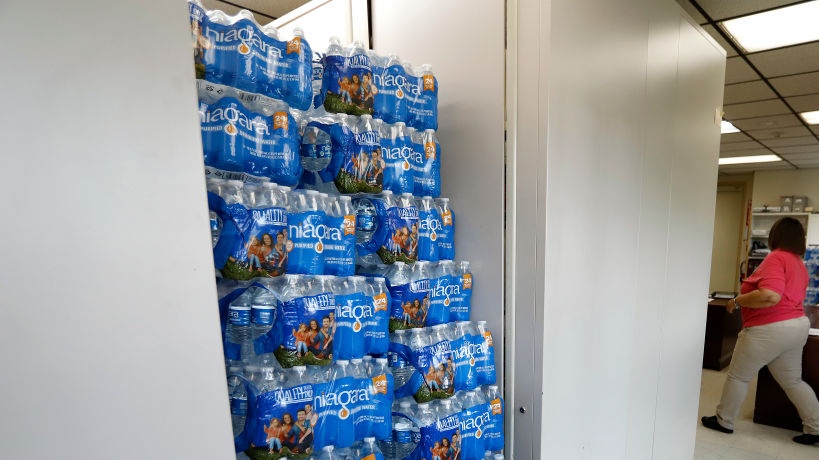The Flint, Michigan, water crisis has dominated national headlines for the last five years, exposing political corruption on local, state and federal levels. Unfortunately, the prolonged incident of environmental racism also highlighted other cities plagued with water supply issues around the country. Most of the cities have populations that are Black and poor. The latest example is Newark, New Jersey. For at least the last two years, the predominantly Black city has been dealing with its own environmental crisis.
1. It dates back to 2017.
Reports dating back to as early as 2017 indicated 10% of the homes in Newark tested with lead levels twice as high as the national average. In the same year, officials were warned of the growing issue. The Natural Resources Defense Council (NRDC), an environmental and health advocacy group, sent a letter to city leaders urging them to act as quickly as possible to address the lead in the drinking water.
"Those levels are approximately the same as the 90th percentile contamination measured by independent testing in Flint, Michigan in August and September, 2015, when Flint was not using any chemical treatment to reduce lead contamination in its water," the letter read.
Time reports Newark went through four consecutive lead tests and ultimately failed the fourth in December 2018. Prior to a massive water bottle roll out this month, the city failed another lead test in June of this year.
2. Like Flint, the water crisis centers on lead-tainted supply.
Like the Flint water crisis, Newark has a lead-tainted water supply. But the issue in Newark is slightly different than that of the Michigan city's. The Pequannock treatment plant, where Newark's drinking water comes from, is not where the lead originated. The city's water pipes are said to be nearly a century old. Corroding pipes contaminated water in both situations. About 15,000 lead service lines in the New Jersey city allowed for lead particles to break off and enter Newark's drinking water. Other cities in the state of New Jersey reportedly could also be affected.
According to New Jersey Advance Media, homes in the nearby town of Bloomfield were tested for lead-contaminated water. “These water filters have been given to residents whose homes contain older plumbing faucets and fixtures of pipes, which may allow lead to build-up in the home,” Bloomfield Mayor Michael Venezia said to media. “We tested our source water and tests showed it had no detectable lead. Water enters our system entirely lead-free.”
3. Some believe Cory Booker is partly to blame.
Since the news of the water crisis broke, Democratic presidential candidate Sen. Cory Booker is now criticized for his administration's role in ignoring the health risks. Booker was mayor of Newark from 2006 to 2013.
New Jersey Advance Media reports he was in the Senate at the time city officials were criticized for the substantial amount of lead found in tap water. Citizens and political opponents are blaming Booker and accusing him of orchestrating a cover-up. In 2015, two years after the end of his mayoral term, the citywide tests for lead were negative.
“Newark’s water emergency demands our federal government’s immediate attention,” Booker tweeted on Wednesday. “Everyone deserves clean, safe water — it’s shameful that our national crisis of lead-contaminated water disproportionately hits poor black and brown communities like my own.”
Despite dismissing allegations, a former cabinet member in Booker’s administration, Dan O’Flaherty, claimed Booker knew there was an issue. The Columbia University economist served as Booker’s finance director for a short time.
"The professional engineering quality was less than optimal,” O’Flaherty, who helped expose corruption at the watershed, told NJ Online. “The probability that someone would make an error was higher when he left than when he came in.”
4. Public schools were among the first to be affected.
Many of the issues with the drinking water first appeared in the city’s public schools. Educators first brought up grievances in 2016. A study showed that about 30 public schools had elevated levels of lead present in drinking water. According to the NRDC, exposure to even low levels of lead can cause “irreversible damage to developing brains and nervous systems.”
In 2018, the NRDC and the Newark Education Workers Caucus, a group of Newark’s public school teachers, announced plans to sue the state and city officials for what they saw as violations of the Safe Drinking Water Act.
5. A $120 million replacement plan has been disclosed.
Earlier in August, the city began to roll out about 70,000 water bottles to 15,000 homes, the Associated Press reports. In 2018, the city began to distribute 40,000 water filters to homes. But Time reports the water filters had no effect. Homes tested still had elevated levels of lead. In February 2019, the city also launched the Lead Service Line Replacement Program to replace defective pipes. Residents are urged to use bottled water. Boiling water will not remove lead. Until the issue is corrected, Newark will have to rely on bottled water like Flint.
Due to the slow response from the federal government, New Jersey officials have taken action to deal with the old pipes. NBC News reports state officials plan to vote on a $120 million plan to replace pipes. "We couldn't wait for them to react," Essex County Executive Joseph DiVincenzo said. "We had to do it first."
